Mothers of GraYce:
Natural Haircare for Senior Mothers
By Megan Davis
Soulcial Scene Contributor
The month of May is that month
when the sun shines a little more and the days get a little
longer. It's also the month that mothers are celebrated.
Mothers of all ages, young and elder, receive cards, flowers
and other gifts to celebrate them as they share
unconditional love and care to their children.
As women age, however, there
are other gifts that natures bestows upon them such as hot
flashes, a wider waist line, wrinkles and gray hair. With
hot flashes, they can dress lighter or drink cold beverages;
for the wide waist line, better eating and exercise can
remedy that; for wrinkles, there are creams and small
procedures that can reverse them. As for gray hair, it can
be covered, but it cannot be reversed.
Gray hair has a life all its
own and, for many aging women, it becomes a part-time job to
manage it. Gray hair has different properties in comparison
to hair with one's natural hair color. When hair is still in
its natural color, it can be manipulated and fashioned into
many styles and it can be treated with many products to
introduce moisture, add shine and hold a style.
To understand gray hair is to
know its characteristics. All hair strands have roots that
are surrounded by a hair follicle. Each hair follicle
contains a certain number of pigment cells which produce a
chemical called melanin. Melanin gives the hair, and skin,
its color.
As we age, the pigment cells in our hair follicles will
gradually die. Because there are fewer pigment cells,
strands of hair will no longer contain as much melanin and
will become a more transparent color like silver or gray.
Once hair begins to lose its
pigment, the texture may change as well. The hair may become
softer or wiry. Gray hair also may become thinner, looser in
curl pattern and drier. This makes caring for gray hair
different than hair with its pigment still intact. This
includes:
•Less frequent shampooing. Often, people with gray hair will
use fewer products and may not perspire as often, lessening
the need to cleanse the hair and scalp.
•Cooler water temperature.
Aging people may have thinner skin which makes them more
sensitive extreme hot or cold temperatures.
•Fewer products. With the
changing texture of gray hair, it is not necessary to apply
excessive products to the hair. Too many oils may weigh the
hair down; too much gel will leave the hair sticky and flat;
and some products may even turn the gray to an unpleasant
yellow tone.
When the hair loses its pigment and turns gray, silver and
even white, it also behaves differently. Its fragile state
makes styles such as blowouts and flat-ironed styles less
likely to be successful. The high temperatures may cause the
hair ends to fray, singe off, or discolor-especially when
combined with certain products.
Another common characteristic
of gray hair is its inability to hold styles or texture.
Two-strand twists, one of the most common natural
hairstyles, are more difficult to achieve on gray hair. This
causes a great deal of frustration to those who have been
used to wearing certain styles.
Braided styles, such as cornrows or plaits will most likely
unravel and coils may not retain their shape. This is
because gray hair also loses its elasticity. Its ability to
retain curl or "bounce back" is less of a possibility.
This is why many choose to
color their gray. It gives "new life" to dying strands. When
coloring gray hair, it may be noticed that while the color
is different, the texture is still soft or fine, yet it may
be easier to accept the texture of the color is more of what
one desires. On the other hand, dis colored gray hair, which
often turns yellow, can be treated with products that
contain UV filters or shampoos that have blue or violet
undertones such as Shimmer Lights by Clairol.
Natural remedies for graying hair include:
• Henna which is used to
condition the hair but it also is used to tint gray or light
hair to a reddish or copper tone.
•Coconut oil applied
regularly is used to prevent graying.
• Amaranth vegetable whose
leaves can be boiled in water and applied to the hair helps
to darken strands.
•Curry leaves may also be
used to prevent graying when added to coconut oil then
applied.
|
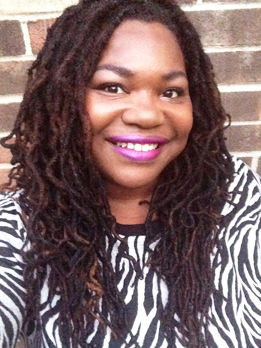
Megan Davis
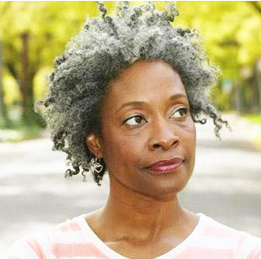
A twistout adds texture and fullness to
thinning, graying hair
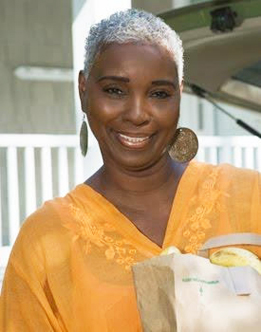
Cropped and shaped natural curls bring out natural facial
features
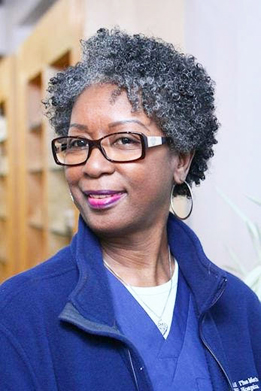
Hair that still has pigment can be blended with the gray
hair to create texture such as this wash and go look
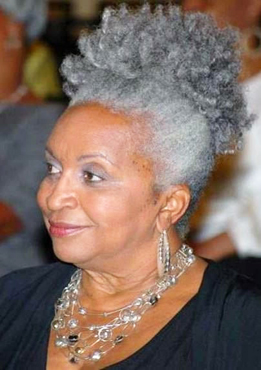
Longer hair that is gray can be fashioned into a high puff
and still looks elegant with the right accessories |
|
All the aforementioned natural
remedies can be used by massaging into the scalp in order to
address graying hair and its common issues.
It is said that gray hair is
a sign of one's wisdom, but there are certain factors that
may lead to gray hair earlier than later. It may be stress
or anxiety, a poor diet, illnesses including auto-immune
diseases, heredity and even hard water or poor quality of
water. When graying occurs before the age of 35, it is
considered to be premature. This can be prevented or slowed
down with the natural remedies listed above.
Styling gray hair doesn't
have to be boring either. Layered haircuts can frame the
face, adding softness while a tapered cut may add texture. A
traditional roller or Doobie set can change curly tresses to
a classic, stretched curl, and gives the appearance of
pressed hair. Many seasoned mothers opt for a simple, shaped
Afro that requires little maintenance and a few products.
As mothers age, it's as the
changing of seasons and the hair is often a sure sign of
change. Yet with grace, mothers embrace those changes and
adjust, finding new ways to showcase their features and
enhance their natural beauty, season by season. They do all
of this while working and caring for their families and
others. It makes it very special for children and others to
celebrate their mothers, knowing all that they do, in spite
of their changes.
|